#Laravel Development Company
Explore tagged Tumblr posts
Text
Top 5 Common Database Design patterns in Laravel
In the world of Laravel development, a well-structured database is the bedrock of a robust and scalable application. While Laravel's Eloquent ORM provides a powerful abstraction layer for interacting with your data, understanding common database design patterns can significantly enhance your development process.
These patterns not only promote code organization and maintainability but also enable you to adapt your database structure to the unique needs of your application. By mastering these patterns, you can build efficient, reliable, and easily maintainable Laravel applications that can handle diverse data requirements.
1. Active Record Pattern:
This is the most common pattern used by Eloquent ORM in Laravel. It encapsulates database logic within model classes, allowing you to interact with the database using object-oriented methods.
Application
This pattern is well-suited for projects of any size and complexity. It simplifies database operations, making them easier to understand and maintain.
Example:

Advantages:
Simplicity: Easy to understand and implement.
Code Reusability: Model methods can be reused throughout your application.
Relationship Management: Built-in support for relationships between models.
Disadvantages:
Tight Coupling: Model logic is tightly coupled to the database, making it harder to test independently.
Complexity: Can become complex for large applications with complex data structures.
2. Data Mapper Pattern:
This pattern separates data access logic from domain logic. It uses a dedicated "mapper" class to translate between domain objects and database records.
Application
This pattern is useful for large-scale applications with complex domain models, as it allows for greater flexibility and modularity. It is particularly useful when working with multiple data sources or when you need to optimize for performance.
Example:

Advantages:
Flexibility: Easily change the database implementation without affecting business logic.
Testability: Easy to test independently from the database.
Modularity: Promotes a modular structure, separating concerns.
Disadvantages:
Increased Complexity: Requires more code and might be overkill for simple applications.
3. Repository Pattern:
This pattern provides an abstraction layer over the data access mechanism, offering a consistent interface for interacting with the database.
Application
This pattern promotes loose coupling and simplifies testing, as you can easily mock the repository and control the data returned. It is often used in conjunction with the Data Mapper pattern.
Example:

Advantages:
Loose Coupling: Decouples business logic from specific data access implementation.
Testability: Easy to mock repositories for testing.
Reusability: Reusable interface for accessing different data sources.
Disadvantages:
Initial Setup: Can require more setup compared to Active Record.
4. Table Inheritance Pattern:
This pattern allows you to create a hierarchical relationship between tables, where child tables inherit properties from a parent table.
Application
This pattern is useful for creating polymorphic relationships and managing data for different types of entities. For example, you could have a User table and separate tables for AdminUser and CustomerUser that inherit from the parent table.
Example:

Advantages:
Polymorphism: Enables handling different types of entities using a common interface.
Code Reusability: Reuses properties and methods from the parent table.
Data Organization: Provides a structured way to organize data for different types of users.
Disadvantages:
Increased Database Complexity: Can lead to a more complex database structure.
5. Schema-less Database Pattern:
This pattern avoids the use of a predefined schema and allows for dynamic data structures. This is commonly used with NoSQL databases like MongoDB.
Application
This pattern is suitable for projects that require highly flexible data structures, such as social media platforms or analytics systems.
Example:

Advantages:
Flexibility: Easily adapt to changing data structures.
Scalability: Suitable for high-volume, rapidly changing data.
High Performance: Efficient for specific use cases like real-time analytics.
Disadvantages:
Increased Complexity: Requires a different approach to querying and data manipulation.
Data Consistency: Can be challenging to maintain data consistency without a schema.
Choosing the Right Pattern:
The best pattern for your project depends on factors like project size, complexity, performance requirements, and your team's experience. It is important to choose patterns that align with the specific needs of your application and ensure long-term maintainability and scalability.
Conclusion:
This exploration of common database design patterns used in Laravel has shed light on the importance of strategic database structuring for building robust and scalable applications. From the simplicity of the Active Record pattern to the sophisticated capabilities of the Data Mapper and Repository patterns, each pattern offers distinct benefits that cater to specific project needs.
By understanding the strengths and applications of these patterns, Laravel developers can choose the optimal approach for their projects, ensuring a well-organized, efficient, and maintainable database architecture. Ultimately, mastering these patterns empowers you to create Laravel applications that are not only functional but also adaptable to evolving data requirements and future growth.
#laravel#laravel development company#laravel framework#laravel developers#database#design#coding#programming
4 notes
·
View notes
Text
Top 10 Laravel Development Companies in the USA in 2024
Laravel is a widely-used open-source PHP web framework designed for creating web applications using the model-view-controller (MVC) architectural pattern. It offers developers a structured and expressive syntax, as well as a variety of built-in features and tools to enhance the efficiency and enjoyment of the development process.

Key components of Laravel include:
1. Eloquent ORM (Object-Relational Mapping): Laravel simplifies database interactions by enabling developers to work with database records as objects through a powerful ORM.
2. Routing: Laravel provides a straightforward and expressive method for defining application routes, simplifying the handling of incoming HTTP requests.
3. Middleware: This feature allows for the filtering of HTTP requests entering the application, making it useful for tasks like authentication, logging, and CSRF protection.
4. Artisan CLI (Command Line Interface): Laravel comes with Artisan, a robust command-line tool that offers commands for tasks such as database migrations, seeding, and generating boilerplate code.
5. Database Migrations and Seeding: Laravel's migration system enables version control of the database schema and easy sharing of changes across the team. Seeding allows for populating the database with test data.
6. Queue Management: Laravel's queue system permits deferred or background processing of tasks, which can enhance application performance and responsiveness.
7. Task Scheduling: Laravel provides a convenient way to define scheduled tasks within the application.
What are the reasons to opt for Laravel Web Development?
Laravel makes web development easier, developers more productive, and web applications more secure and scalable, making it one of the most important frameworks in web development.
There are multiple compelling reasons to choose Laravel for web development:
1. Clean and Organized Code: Laravel provides a sleek and expressive syntax, making writing and maintaining code simple. Its well-structured architecture follows the MVC pattern, enhancing code readability and maintainability.
2. Extensive Feature Set: Laravel comes with a wide range of built-in features and tools, including authentication, routing, caching, and session management.
3. Rapid Development: With built-in templates, ORM (Object-Relational Mapping), and powerful CLI (Command Line Interface) tools, Laravel empowers developers to build web applications quickly and efficiently.
4. Robust Security Measures: Laravel incorporates various security features such as encryption, CSRF (Cross-Site Request Forgery) protection, authentication, and authorization mechanisms.
5. Thriving Community and Ecosystem: Laravel boasts a large and active community of developers who provide extensive documentation, tutorials, and forums for support.
6. Database Management: Laravel's migration system allows developers to manage database schemas effortlessly, enabling version control and easy sharing of database changes across teams. Seeders facilitate the seeding of databases with test data, streamlining the testing and development process.
7. Comprehensive Testing Support: Laravel offers robust testing support, including integration with PHPUnit for writing unit and feature tests. It ensures that applications are thoroughly tested and reliable, reducing the risk of bugs and issues in production.
8. Scalability and Performance: Laravel provides scalability options such as database sharding, queue management, and caching mechanisms. These features enable applications to handle increased traffic and scale effectively.
Top 10 Laravel Development Companies in the USA in 2024
The Laravel framework is widely utilised by top Laravel development companies. It stands out among other web application development frameworks due to its advanced features and development tools that expedite web development. Therefore, this article aims to provide a list of the top 10 Laravel Development Companies in 2024, assisting you in selecting a suitable Laravel development company in the USA for your project.
IBR Infotech

IBR Infotech excels in providing high-quality Laravel web development services through its team of skilled Laravel developers. Enhance your online visibility with their committed Laravel development team, which is prepared to turn your ideas into reality accurately and effectively. Count on their top-notch services to receive the best as they customise solutions to your business requirements. Being a well-known Laravel Web Development Company IBR infotech is offering the We provide bespoke Laravel solutions to our worldwide customer base in the United States, United Kingdom, Europe, and Australia, ensuring prompt delivery and competitive pricing.
Additional Information-
GoodFirms : 5.0
Avg. hourly rate: $25 — $49 / hr
No. Employee: 10–49
Founded Year : 2014
Verve Systems
Elevate your enterprise with Verve Systems' Laravel development expertise. They craft scalable, user-centric web applications using the powerful Laravel framework. Their solutions enhance consumer experience through intuitive interfaces and ensure security and performance for your business.
Additional Information-
GoodFirms : 5.0
Avg. hourly rate: $25
No. Employee: 50–249
Founded Year : 2009
KrishaWeb

KrishaWeb is a world-class Laravel Development company that offers tailor-made web solutions to our clients. Whether you are stuck up with a website concept or want an AI-integrated application or a fully-fledged enterprise Laravel application, they can help you.
Additional Information-
GoodFirms : 5.0
Avg. hourly rate: $50 - $99/hr
No. Employee: 50 - 249
Founded Year : 2008
Bacancy
Bacancy is a top-rated Laravel Development Company in India, USA, Canada, and Australia. They follow Agile SDLC methodology to build enterprise-grade solutions using the Laravel framework. They use Ajax-enabled widgets, model view controller patterns, and built-in tools to create robust, reliable, and scalable web solutions
Additional Information-
GoodFirms : 4.8
Avg. hourly rate: $25 - $49/hr
No. Employee: 250 - 999
Founded Year : 2011
Elsner
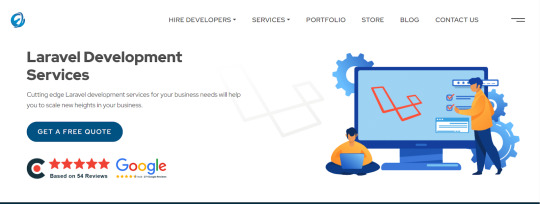
Elsner Technologies is a Laravel development company that has gained a high level of expertise in Laravel, one of the most popular PHP-based frameworks available in the market today. With the help of their Laravel Web Development services, you can expect both professional and highly imaginative web and mobile applications.
Additional Information-
GoodFirms : 5
Avg. hourly rate: < $25/hr
No. Employee: 250 - 999
Founded Year : 2006
Logicspice

Logicspice stands as an expert and professional Laravel web development service provider, catering to enterprises of diverse scales and industries. Leveraging the prowess of Laravel, an open-source PHP framework renowned for its ability to expedite the creation of secure, scalable, and feature-rich web applications.
Additional Information-
GoodFirms : 5
Avg. hourly rate: < $25/hr
No. Employee: 50 - 249
Founded Year : 2006
Sapphire Software Solutions
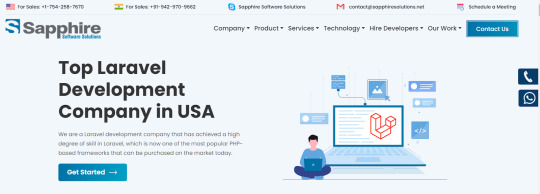
Sapphire Software Solutions, a leading Laravel development company in the USA, specialises in customised Laravel development, enterprise solutions,.With a reputation for excellence, they deliver top-notch services tailored to meet your unique business needs.
Additional Information-
GoodFirms : 5
Avg. hourly rate: NA
No. Employee: 50 - 249
Founded Year : 2002
iGex Solutions
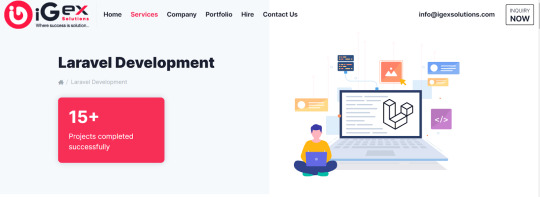
iGex Solutions offers the World’s Best Laravel Development Services with 14+ years of Industry Experience. They have 10+ Laravel Developer Experts. 100+ Elite Happy Clients from there Services. 100% Client Satisfaction Services with Affordable Laravel Development Cost.
Additional Information-
GoodFirms : 4.7
Avg. hourly rate: < $25/hr
No. Employee: 10 - 49
Founded Year : 2009
Hidden Brains
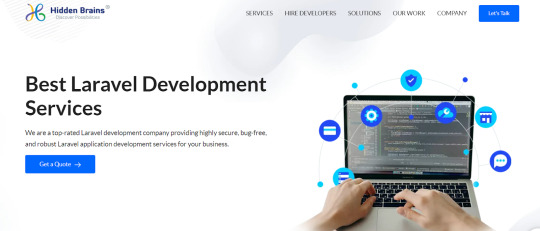
Hidden Brains is a leading Laravel web development company, building high-performance Laravel applications using the advantage of Laravel's framework features. As a reputed Laravel application development company, they believe your web application should accomplish the goals and can stay ahead of the rest.
Additional Information-
GoodFirms : 4.9
Avg. hourly rate: < $25/hr
No. Employee: 250 - 999
Founded Year : 2003
Matellio
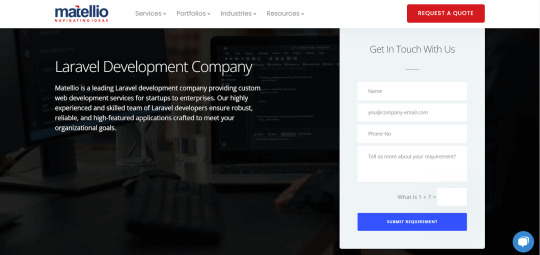
At Matellio, They offer a wide range of custom Laravel web development services to meet the unique needs of their global clientele. There expert Laravel developers have extensive experience creating robust, reliable, and feature-rich applications
Additional Information-
GoodFirms : 4.8
Avg. hourly rate: $50 - $99/hr
No. Employee: 50 - 249
Founded Year : 2014
What advantages does Laravel offer for your web application development?
Laravel, a popular PHP framework, offers several advantages for web application development:
Elegant Syntax
Modular Packaging
MVC Architecture Support
Database Migration System
Blade Templating Engine
Authentication and Authorization
Artisan Console
Testing Support
Community and Documentation
Conclusion:
I hope you found the information provided in the article to be enlightening and that it offered valuable insights into the top Laravel development companies.
These reputable Laravel development companies have a proven track record of creating customised solutions for various sectors, meeting client requirements with precision.
Over time, these highlighted Laravel developers for hire have completed numerous projects with success and are well-equipped to help advance your business.
Before finalising your choice of a Laravel web development partner, it is essential to request a detailed cost estimate and carefully examine their portfolio of past work.
#Laravel Development Companies#Laravel Development Companies in USA#Laravel Development Company#Laravel Web Development Companies#Laravel Web Development Services
2 notes
·
View notes
Text
Top 10 Key Points to Ensure Security for Your Laravel Application

In Laravel web application development, security is one of the essential paramount. As the digital landscape continues to expand, the Importance of security in web applications, particularly those built on the Laravel framework, has reached an all-time high. In this era of interconnectedness, where information flows seamlessly across the virtual realm, the potential threats and vulnerabilities have also escalated.
The landscape of online threats has grown more sophisticated, encompassing various malicious activities ranging from data breaches to identity theft. This evolving threat landscape calls for a steadfast commitment to proactive security measures. Waiting for a security breach before addressing vulnerabilities is a risk no modern developer can afford to take.
The significance of bolstering security in Laravel web application development. While Laravel provides a robust and versatile platform for creating dynamic web applications, it's essential to recognize that even the most advanced framework is not immune to potential security breaches. As your Laravel application evolves, it becomes a showcase of your technological prowess and a potential target for cyber threats.
The Importance of proactive security measures should be highlighted further. Developers and businesses must adopt a security-first mindset when crafting their digital creations, which means staying informed about the latest security trends, continuously updating and patching the application, and adhering to best practices for safeguarding sensitive user data.
We'll delve into 10 critical checkpoints that can significantly enhance the security of your Laravel web application. These checkpoints encompass a comprehensive approach to securing various aspects of your application, from authentication and authorization to protecting against common web vulnerabilities. By diligently implementing these checkpoints, you'll be taking a substantial stride towards fortifying your Laravel web application against the ever-persistent threats lurking in the digital domain.
10 Key Checkpoints to Focus On
Here's your comprehensive Laravel Security Checklist to ensure a robust and safeguarded web application.
1. Secure Authentication and Authorization

In the intricate world of Laravel web application development, security is an indispensable pillar for creating a trustworthy and resilient digital presence. One of the cornerstone elements in this security fortress is the implementation of secure authentication and authorization mechanisms. Let's delve into how these critical aspects are pivotal in fortifying your Laravel application against potential threats.
Secure Authentication: Building the First Line of Defense
Authentication is verifying the identity of users attempting to access your application. It forms the cornerstone of security by ensuring that only authorized individuals can interact with sensitive data and functionalities. In the realm of Laravel, this process is made significantly more manageable through the framework's built-in authentication features.
Implementing secure authentication involves
Strong Password Policies: Enforce complex passwords, combining uppercase and lowercase letters, numbers, and special characters. Laravel provides password validation rules to help you accomplish this.
Two-Factor Authentication (2FA): Enhance security by requiring users to provide an additional authentication factor beyond their password. Laravel offers seamless integration with 2FA for an added layer of protection.
Account Lockouts: Implement mechanisms that lock accounts after a specified number of unsuccessful login attempts, preventing brute-force attacks by temporarily halting further login attempts.
Authorization: Ensuring Granular Access Control
Authorization, however, deals with controlling what authenticated users can do within the application. It's about granting permissions and access rights based on roles and responsibilities, ensuring that sensitive actions are restricted to those who need them.
Key steps in implementing effective authorization include
Role-Based Access Control (RBAC): Define roles such as "admin," "user," or "manager," and associate them with specific permissions. Laravel's RBAC system lets you assign roles and permissions effortlessly.
Middleware Authorization: Leverage Laravel's middleware to restrict access to routes or controllers based on user roles or custom conditions. This is a powerful way to ensure that only authorized users can perform specific actions.
Resource Controllers: Utilize resource controllers to create a consistent and structured approach to handling CRUD operations. These controllers can be easily configured to enforce authorization rules for specific actions.
Dynamic Authorization Policies: Laravel's policy system lets you define authorization logic in a structured manner. It's beneficial for complex access control requirements and allows for fine-grained control over what users can do.
In a world where digital threats are evolving rapidly, securing your Laravel application's authentication and authorization processes is paramount. By implementing robust authentication mechanisms and enforcing precise authorization rules, you're safeguarding sensitive data and building a foundation of trust with your users. Remember, security isn't just a one-time task; it's an ongoing commitment that requires vigilance and adaptability in the face of ever-changing cyber threats.
2. Keep Laravel and Dependencies Updated
In the dynamic realm of Laravel web application development, staying ahead in the security game is an ongoing endeavor. One of the fundamental practices that forms the bedrock of a secure digital presence is the consistent updating of your Laravel framework and its associated dependencies. Let's explore why this practice is essential and how it contributes to the overall security of your application.
The Power of Regular Updates
Technology, much like the world around us, is in a constant state of evolution. This evolution is driven not only by innovation but also by identifying and rectifying vulnerabilities and weaknesses. In the context of Laravel development, regular updates to both the core framework and its dependencies play a pivotal role in ensuring the security and stability of your application.
Why Updates Matter
Security Patches: Vulnerabilities can emerge at any software lifecycle stage. Developers and the open-source community work diligently to identify and address these vulnerabilities. Regular updates ensure that your Laravel application is fortified with the latest security patches, minimizing the risk of exploitation.
Compatibility: As Laravel evolves, updates often improve compatibility with newer PHP versions, web servers, and databases. Staying updated ensures your application remains in sync with the broader web development ecosystem.
Performance and Features: Updates not only fix issues; they also introduce performance enhancements and new features. Embracing these updates can lead to a more efficient application that delivers a better user experience.
Dependencies: Handle with Care
Laravel development heavily relies on various external packages and libraries. While these dependencies contribute to the efficiency and functionality of your application, they can also introduce vulnerabilities if not managed appropriately.
Best Practices for Dependency Management:
Regular Audits: Periodically review the dependencies your Laravel development company utilizes. Check for any vulnerabilities reported in these packages and prioritize updating them accordingly.
Automated Tools: Leverage automated tools that can scan your project's dependencies for known security issues. This can help you identify potential risks and take corrective action swiftly.
Version Pinning: Specify the exact versions of dependencies your application uses. This prevents unexpected updates that might introduce breaking changes or vulnerabilities.
In the rapidly evolving web application security landscape, treating updates as a proactive security measure is paramount. By ensuring your Laravel framework and dependencies are up to date, you're demonstrating a commitment to maintaining a robust digital fortress for your application. This safeguards sensitive user data and positions your Laravel development company as a conscientious custodian of digital security. Remember, in technology, staying current isn't just an option—it's necessary for a secure and successful future.
3. Validate User Input
The ever-evolving landscape of Laravel development, the adage "Garbage In, Garbage Out" holds immense relevance. One of the pivotal checkpoints in ensuring the robustness of your Laravel application's security is the validation of user input. Let's dive into why validating user input is crucial and how it is a formidable shield against potential vulnerabilities.
The Essence of User Input Validation
User input is the gateway through which your Laravel application interacts with its users. Whether it's a login form, a search bar, or a comment section, user input is integral to the functionality of your application. However, it can also become an entry point for malicious activities if left unchecked.
Why Validate User Input:
Mitigating Injection Attacks: Attackers can exploit unvalidated user input to inject malicious code into your application. This includes infamous threats like SQL injection and cross-site scripting (XSS). Proper validation drastically reduces the risk of such attacks.
Data Integrity: Validating user input ensures that the data flowing into your application is consistent and matches the expected format. This helps maintain data integrity and prevents errors caused by unexpected information.
Enhancing User Experience: You can guide users to input data in the correct format by providing real-time validation feedback. This not only prevents submission errors but also enhances the overall user experience.
Implementing Effective Input Validation in Laravel
Utilize Laravel's Validation Rules: Laravel offers a robust validation system that includes a wide array of predefined rules. These rules cover everything from required fields and email formats to custom validation logic.
Sanitize and Filter Input: Consider sanitizing and filtering user input alongside validation. Sanitization removes potentially harmful characters, while filtering ensures that information adheres to specific formats.
Client-Side Validation: While server-side validation is paramount, supplement it with client-side validation using JavaScript. This provides instant feedback to users and reduces unnecessary server requests.
Best Practices for User Input Validation
Never Trust User Input: Treat all incoming user input as potentially malicious until proven otherwise. Validate and sanitize input even if it seems harmless.
Whitelist Validation: Define an allowlist of allowed characters and formats for each input field. Reject input that doesn't conform to these predefined patterns.
Regular Updates: Like any other security practice, stay updated with Laravel's latest validation features and best practices. This ensures you're using the most effective tools available.
In the intricate realm of Laravel development, user input validation isn't just a technical practice; it's a shield that guards your application against many threats. By diligently validating user input, you're bolstering your application's security and reinforcing trust with your users. In the dynamic world of web development, where innovation meets vulnerability, validation is your steadfast ally in pursuing a secure and seamless user experience.
4. Protect Against SQL Injection
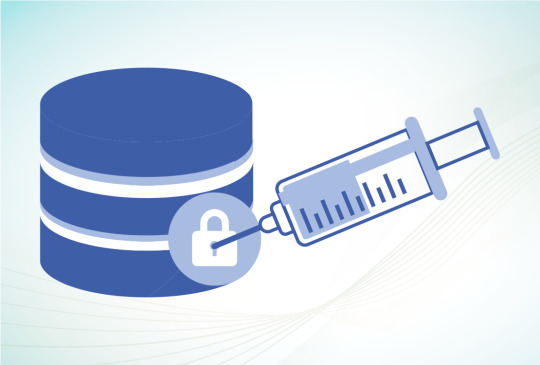
Shielding your digital fortress through meticulous Laravel development services involves a critical step: Protect against SQL injection. This threat arises when user inputs lack proper sanitation, potentially enabling malicious actors to manipulate SQL queries and gain unauthorized database access.
SQL injection attacks can lead to data exposure, alteration, or deletion. Laravel's defences are robust. Its query binding technique parameterizes user inputs, preventing malicious SQL execution. The Eloquent ORM further enhances security by abstracting SQL interactions and automatically escaping values.
Adhering to best practices is paramount. Prioritize parameterized queries over direct concatenation, sanitize inputs, and conduct regular code audits to ensure secure methods. By fortifying your Laravel application against SQL injection, you're erecting a robust barrier against a damaging vulnerability while providing your Laravel development services maintain the utmost integrity and user trust.
5. Cross-Site Scripting (XSS) Prevention
In securing your digital haven with proficient Laravel development practices, countering Cross-Site Scripting (XSS) emerges as a pivotal measure. XSS occurs when malicious code infiltrates a website through unfiltered user inputs, potentially compromising user data and integrity.
The gravity of XSS lies in its ability to expose sensitive information or perform malicious actions under the user's identity. Laravel offers potent tools to thwart such threats:
Blade Templating: Laravel's Blade templating engine automatically escapes variables, preventing unintended script execution.
XSS Middleware: Laravel provides built-in middleware for encoding user inputs, adding an extra layer of protection.
Content Security Policy (CSP): Implementing CSP headers in your Laravel application restricts the sources from which content can be loaded, reducing the risk of XSS attacks.
Adhering to these precautions is essential. Validate and sanitize inputs, embrace Laravel's security features, and implement a robust CSP. By guarding against XSS vulnerabilities, you ensure your Laravel development maintains a resilient and trustworthy digital presence.
6. Implement HTTPS and SSL
In web application development, particularly in Laravel, bolstering security is paramount. A crucial step in this pursuit is the implementation of HTTPS and SSL protocols. These measures are essential to safeguard sensitive data transmitted between users and your application.
HTTPS (Hypertext Transfer Protocol Secure) encrypts the data between users' browsers and your application's server, thwarting potential eavesdropping and tampering. SSL (Secure Sockets Layer) certificates are the foundation of this encryption, ensuring that communication remains confidential.
Advantages of HTTPS and SSL:
Data Encryption: HTTPS encrypts data during transit, preventing unauthorized access to sensitive information.
Trust and SEO: SSL certificates enhance user trust, as indicated by the padlock symbol in browsers. Search engines also favor HTTPS websites, improving SEO rankings.
Authentication: SSL certificates verify your application's authenticity, shielding users from potential phishing sites.
Implementing HTTPS and SSL involves obtaining a valid SSL certificate and configuring your Laravel application for secure connections. By adopting these measures, you're securing your web application development, fostering trust among users, and ensuring compliance with modern security standards.
7. Secure Session Management
In web application development, security isn't just a feature—it's a necessity. A crucial aspect of building a robust and trustworthy application is ensuring secure session management. Sessions are pivotal in maintaining user interactions and data, making their protection paramount.
Laravel offers robust mechanisms to fortify session management:
Session Encryption: Laravel automatically encrypts session data, preventing unauthorized access and ensuring confidentiality.
CSRF Protection: Cross-Site Request Forgery (CSRF) attacks can compromise sessions. Laravel's built-in CSRF protection safeguards against such threats.
Expire and Regenerate: Set session expiration times and periodically regenerate session IDs to minimize the window of vulnerability.
By implementing secure session management practices in your web application development, you create a shield against unauthorized access and data breaches. This preserves user trust and solidifies your commitment to crafting applications that prioritize security and integrity.
8. Protect Against Cross-Site Request Forgery (CSRF)
Safeguarding web applications is a top priority in Laravel development. To fortify your digital haven, countering Cross-Site Request Forgery (CSRF) threats is crucial. CSRF attacks manipulate authenticated users into executing malicious actions unknowingly. Laravel provides a robust defense:
CSRF Tokens: Laravel automatically generates unique tokens for each user session, validating the authenticity of requests.
Middleware Protection: Laravel's built-in CSRF middleware verifies tokens, preventing unauthorized requests from being executed.
By integrating these measures, you fortify your Laravel application against CSRF vulnerabilities. This secures user interactions and demonstrates your commitment to proactive security practices in modern web development.
9. Harden Configuration and File Permissions
In the landscape of Laravel security, enhancing configuration settings and file permissions is a critical stride. Securing sensitive files, such as configuration files, shields against unauthorized access and potential breaches. Laravel's framework offers key tactics:
Restricted Access: Limit access to sensitive configuration files by setting appropriate permissions. This prevents unauthorized users from tampering with vital settings.
Environment Configuration: Store sensitive data in environment files and never expose them in version control. Laravel's .env file shields sensitive variables from prying eyes.
By meticulously configuring permissions and safeguarding critical files, you erect a solid barrier against potential threats. This reflects an unwavering commitment to fortifying your Laravel application and upholding security standards in modern web development.
10. Use Content Security Policy (CSP)
Bolstering security in Laravel involves advanced tactics, including a Content Security Policy (CSP). CSP guards against cross-site scripting (XSS) and data injection attacks. It achieves this by specifying approved content sources, mitigating the risk of malicious script execution. Laravel's integration of CSP fortifies your defense:
Malicious Content Mitigation: CSP curtails the potential impact of XSS attacks by regulating the domains from which content can be loaded.
Policy Customization: Laravel empowers you to tailor CSP rules to suit your application's specific requirements, balancing security and functionality.
By embracing CSP, you establish a robust security framework that exemplifies Laravel's commitment to secure, modern web development practices.
Top Laravel Security Packages for Developers
In the realm of Laravel development, ensuring robust security is paramount. Several key packages aid developers in fortifying their applications. Here are three notable options:
Laravel-ACL: Access Control Lists (ACL) are fundamental to controlling user permissions. This package simplifies ACL implementation, offering granular control over user access to different parts of your application.
Laravel Security: As the name suggests, this package enhances overall security. It provides features like XSS protection, safe redirects, and content filtering, contributing to a fortified application.
Laravel Security Component: This package takes security up a notch by integrating robust security components. It includes encryption, hashing, validation, and more tools, streamlining your security efforts.
For a Laravel development agency, these packages are invaluable assets. By incorporating them into your development process, you expedite security implementation and establish a strong foundation for crafting secure, reliable applications that clients can trust.
Conclusion
In the intricate realm of Laravel security, these checkpoints act as sentinels, fortifying your application's defenses. Secure authentication, vigilant updates, meticulous validation, and shielded configurations create a robust bastion. Protection against threats like SQL injection, XSS, and CSRF forms an unbreachable wall. Implementation of HTTPS, secure session handling, and CSP reinforce your fortifications. Familiarity with essential security packages like Laravel-ACL, Laravel Security, and Security Component adds the final layer. As a Laravel developer, embracing these measures ensures your applications are secured, and your expertise is unwavering in the face of evolving threats.
Source: Top 10 Key Points to Ensure Security for Your Laravel Application
2 notes
·
View notes
Text

Top Laravel Development Company– Dazonn Technologies!
Dazonn Technologies is a leading Laravel development company offering robust, scalable, and secure web application solutions tailored to your business needs. With a skilled team of Laravel experts, we build high-performance websites and custom web applications that drive growth. As a trusted Laravel development company, we ensure seamless project execution and timely delivery, helping you stay ahead in the digital space with cutting-edge, feature-rich solutions. For more information, visit our website or contact us at +1-929-421-7136.
0 notes
Text
Cost-effective Laravel Development Services by Shiv Technolabs
Shiv Technolabs offers cost-effective Laravel development services to build secure, fast, and scalable web applications. Our team uses Laravel’s powerful features like MVC architecture, built-in security, and database management to create custom solutions for businesses.
Whether you need a simple website or a complex web platform, we focus on clean coding, smooth performance, and easy maintenance. Partner with us to build web apps that meet real-world needs with precision.
0 notes
Text

Premium Laravel development doesn’t have to come with a hefty price tag. We offer competitive and flexible pricing models to suit businesses of all sizes.
0 notes
Text
How to Choose the Right Laravel Development Company for Your Next Project
Looking to build a high-performing web application? Partnering with a Laravel development company is one of the smartest moves you can make in 2025. Laravel, a powerful PHP framework, offers clean architecture, built-in security, and rapid development capabilities—making it ideal for startups and enterprises alike. A professional Laravel development company brings deep expertise in custom application development, API integration, performance optimization, and long-term support, ensuring your project is scalable, secure, and future-ready. Whether you're launching a new digital product or modernizing an existing platform, choosing the right Laravel partner can significantly accelerate your time-to-market and deliver a seamless user experience.
0 notes
Text
Why do you think Laravel is popular among developers?
Laravel is popular among developers for a variety of reasons, both technical and practical. Here's why it stands out:
Elegant Syntax
Laravel offers clean, readable, and expressive syntax, making development faster and more enjoyable.
MVC Architecture
It follows the Model-View-Controller (MVC) pattern, helping developers keep code organized, scalable, and maintainable.
Built-in Tools and Features
Laravel includes powerful built-in tools like Blade Templating Engine, Eloquent ORM for database interaction, Artisan CLI for automating tasks, Routing, Authentication, Queues, Mail, and more
Rapid Application Development
Laravel comes with tools that help in quick prototyping and faster project completion.
Security
It offers robust security features like CSRF protection, password hashing, and SQL injection prevention right out of the box.
Strong Ecosystem
Laravel’s ecosystem includes tools like Laravel Forge (server deployment), Laravel Vapor (serverless deployment), Laravel Nova (admin panel), Laravel Mix (asset compilation)
Huge Community Support
Laravel has a large, active community and excellent documentation, which makes it easy to find help and resources.
Testing Made Easy
Laravel is built with testing in mind and includes PHPUnit support by default, helping developers ensure quality code.
Scalability
With support for microservices and integrations with cloud services, Laravel apps can scale effectively for enterprise use.
API-Ready
Laravel makes it easy to build RESTful APIs or even use it purely as a backend API service.
0 notes
Text
When deciding between Laravel and Symfony, it's essential to consider your project needs. Laravel shines with its user-friendly syntax and extensive out-of-the-box functionalities, making it ideal for rapid development and handling common web application tasks with ease. Its vibrant community and ecosystem offer a wide range of packages, which can be a huge time-saver for developers looking to implement complex features quickly.
On the other hand, Symfony is known for its robustness, flexibility, and scalability, making it a preferred choice for large, enterprise-level applications. With a component-based architecture, Symfony allows developers to pick and choose components, making it highly customizable. If you value performance and long-term support, Symfony might be the better choice, while Laravel is perfect for projects needing fast deployment and intuitive development.
2 notes
·
View notes
Text
n today’s digital-first world, businesses of all sizes leverage web application development services to streamline operations, enhance customer engagement, and stay ahead in a competitive market. With the surge in online activity, the demand for high-performance, secure, and scalable web applications has never been greater.
#Laravel web application development company#Laravel Development Services USA#web application development services#Laravel development company
0 notes
Text

This guide unpacks what it takes to build a scalable SaaS application using Laravel—talking real architecture choices, killer Laravel features.
0 notes
Text
0 notes
Text

Conquerors is a premier Laravel web development company in Hyderabad, providing expert solutions for developing secure and scalable web applications. Our experienced team utilizes Laravel's powerful features to build customized, efficient, and user-friendly websites. At Conquerors, we are committed to delivering high-quality, responsive designs that strengthen your online presence and drive business growth.
#laravel web development services#laravel development company#laravel agency#laravel development services#laravel development#laravel development agency#laravel web development#laravel company#laravel specialist#laravel outsourcing#laravel software development#laravel website development services#laravel web development company#laravel website development
1 note
·
View note
Text
1 note
·
View note
Text
Top Skills to Look for When Hiring Laravel Developers 🚀

Hiring the right Laravel developer is crucial for building a high-quality web application. Laravel, one of the most popular PHP frameworks, offers robust features that streamline web development. However, not all developers have the expertise to fully utilize Laravel’s capabilities. When businesses look to hire expert Laravel developers, it’s essential to evaluate their technical and soft skills to ensure project success.
Here are the top skills to consider before making a hiring decision.
1. Proficiency in Core PHP and Laravel Framework 🔥
Laravel is a PHP-based framework, making PHP proficiency a fundamental requirement. A skilled Laravel developer should have a deep understanding of PHP syntax, object-oriented programming (OOP), and PHP functions. Strong expertise in Laravel’s core functionalities, including routing, middleware, controllers, and migrations, ensures seamless application development.
2. Strong Understanding of MVC Architecture 🏗️
Laravel follows the Model-View-Controller (MVC) architecture, which helps in maintaining code organization and scalability. A professional Laravel developer should be able to efficiently implement MVC principles, ensuring a well-structured and maintainable codebase.
3. Expertise in Database Management 🗄️
Databases play a crucial role in web applications, and Laravel simplifies database management through Eloquent ORM and query builder. When hiring Laravel developers, assessing their experience in handling MySQL, PostgreSQL, or MongoDB is essential. Skills in designing relational databases, writing efficient queries, and managing migrations ensure smooth data operations.
4. API Development and Integration 🌍
Modern web applications often require API integrations for seamless communication between services. A Laravel expert should be proficient in RESTful APIs and GraphQL, enabling smooth interactions between frontend and backend applications. Knowledge of authentication methods like OAuth, JWT, and API security practices is a valuable asset.
5. Frontend Technologies Knowledge 🎨
Although Laravel is a backend framework, an expert Laravel developer should have a basic understanding of frontend technologies like HTML, CSS, JavaScript, Vue.js, and React.js. This ensures better collaboration with front-end developers and enhances full-stack development capabilities.
6. Proficiency in Testing and Debugging 🛠️
Bugs and errors can compromise the functionality of a web application. A professional Laravel developer should have experience with Laravel’s built-in testing tools like PHPUnit and Laravel Dusk. Writing unit tests, debugging code, and optimizing performance are crucial skills that improve application reliability.
7. Version Control Systems (Git, GitHub, Bitbucket) 🔄
Code management and collaboration become easier with version control systems. A Laravel developer must be proficient in Git, enabling them to track changes, collaborate efficiently, and manage code repositories on platforms like GitHub or Bitbucket.
8. Security Best Practices 🔐
Web applications must be protected from threats like SQL injection, cross-site scripting (XSS), and CSRF attacks. An experienced Laravel developer follows security best practices, such as data encryption, input validation, authentication mechanisms, and Laravel’s built-in security features.
9. Cloud Services and Deployment Knowledge ☁️
A Laravel developer should be familiar with cloud platforms like AWS, Google Cloud, and DigitalOcean for smooth application deployment. Knowledge of Docker, Kubernetes, and CI/CD pipelines further enhances deployment efficiency.
10. Problem-Solving and Communication Skills 🧠💬
Technical skills are essential, but problem-solving abilities and clear communication make a Laravel developer truly outstanding. A skilled developer can quickly identify issues, suggest improvements, and collaborate effectively with teams.
Final Thoughts 💡
Finding the right Laravel developer requires a careful evaluation of technical and soft skills. Whether building a small business website or a large enterprise application, it’s essential to hire expert Laravel developers who possess a deep understanding of the framework and best development practices. By prioritizing these skills, businesses can ensure the success of their Laravel-based projects.
Want to hire a skilled Laravel developer? Look for these key skills to make an informed decision! 🚀
#offshore laravel developers#expert laravel developers#hire dedicated laravel programmers#hire dedicated laravel web developers#hire expert laravel developer#hire laravel consultant#hire professional laravel developers#laravel app developers#laravel programmer for hire#dedicated laravel developer#offshore laravel development#offshore laravel programmers#top laravel developers#hire laravel developer in india#laravel development services india#top laravel development companies in india#dedicated laravel programmers#best company for php developer in india#hire laravel expert#laravel developers#laravel development company#hire dedicated laravel developer#laravel web development services#laravel app development company#laravel app development#hire laravel developer india#laravel development company india#hire laravel developer#laravel developer india#php development india
0 notes
Text
In today’s fast-paced digital world, businesses demand robust, scalable, and high-performing web solutions. Converthink, a trusted technology partner, brings you top-notch Laravel development services designed to transform your ideas into powerful web applications.
0 notes